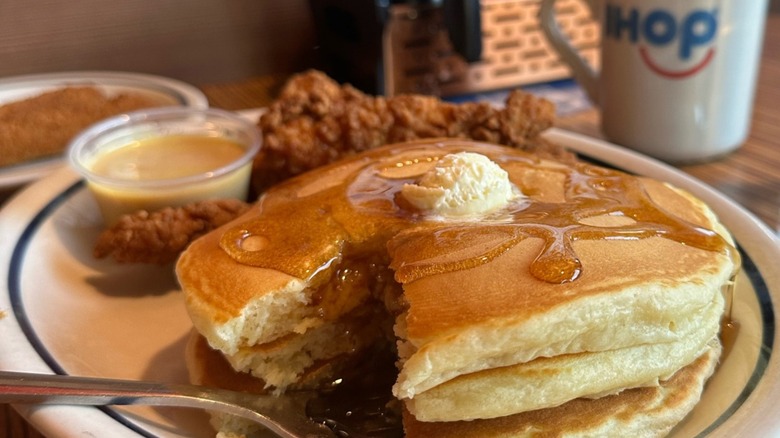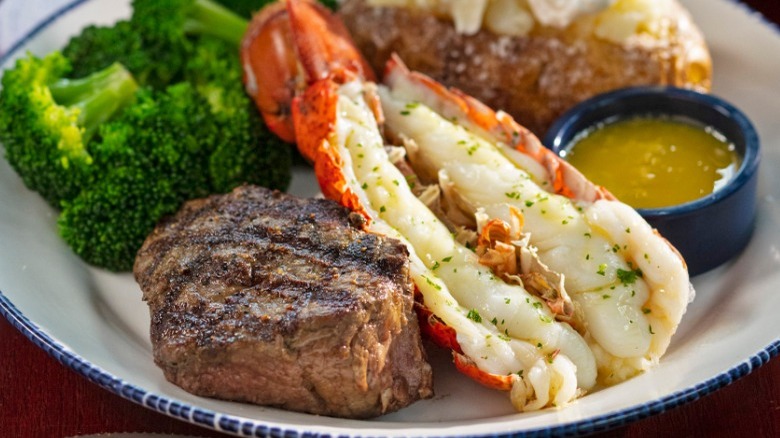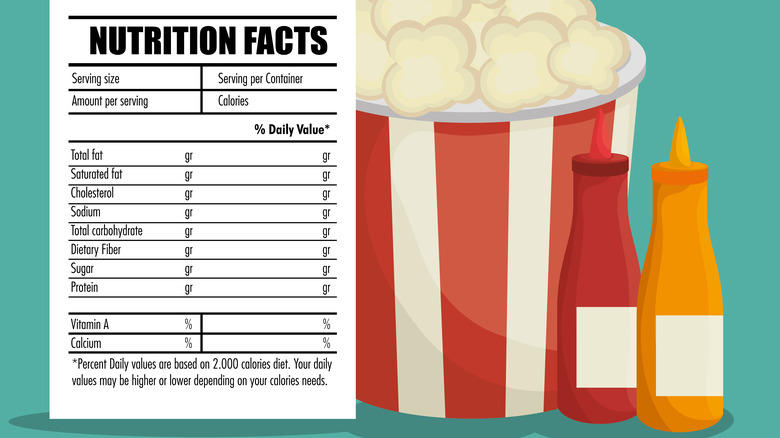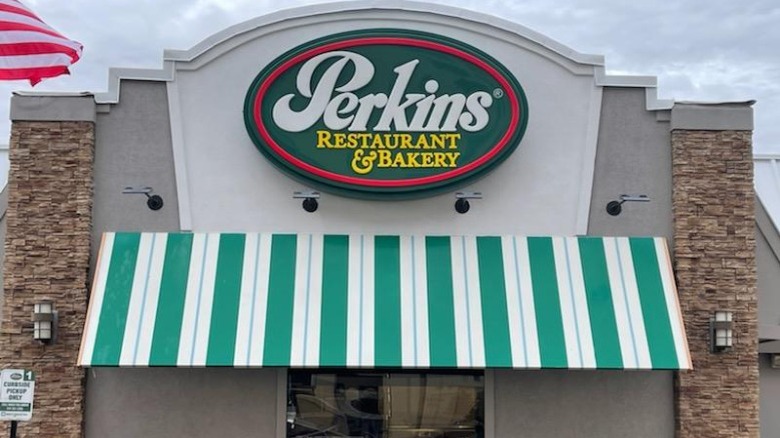Here's Why I Never Feel Guilty Eating At A Chain Restaurant
Since I write about food for a living, you'd probably assume that I'm pretty into it, and you'd be correct in that assumption. I love to explore new restaurants, food trucks, and specialty grocery stores and I'm lucky enough to live in a neighborhood where we have restaurant options ranging from Pakistani to Laotian to Serbian to as well as dozens of pretty decent taquerias. That being said, though, I'm also not the kind of food snob who looks down on chain restaurants. I've had some pretty decent steaks at Outback, and I dearly miss the late, great Bugaboo Creek, which was a Canadian-themed steakhouse known for its animatronic wildlife. Plus, nobody does breakfast like Denny's or IHOP, and my son and I have a tradition of eating at one or the other on Thanksgiving morning for reasons we've now forgotten.
Yes, chain restaurants can sometimes be problematic, but so can independent ones — both chains and non-chains have been known to misrepresent what's on the menu, and both can be equally guilty of mistreating employees. Why, then, should I feel any guilt or shame about choosing to eat at a chain restaurant instead of an independent one? Chain restaurants, too, have their place in the restaurant food chain, as it were, and they even have some advantages over non-chains in certain areas.
Chains sometimes offer pretty good deals
I'll start with my most frivolous reason: I love a good coupon or BOGO, and some chain restaurants offer these deals on a regular basis. Yes, I'm familiar with the old adage that quality is better than quantity, but as far as I'm concerned, that's just rich people talk. In my book, a so-so dinner I can actually afford beats the hell out of a sublime culinary experience I'll never have. (Besides, I hear Noma really isn't all that, anyway).
When my son was small, he and I would regularly visit Applebee's for those 2-for-$20 deals, complete with appetizer — still not a bad deal, even though the price may be up to $24 now. Although I was not indulging in the Dollaritas at the time, you've got to admit that you can't beat the price on those, either, even if the drinks are watered down. (Do you really think high-priced bars never resort to this trick?) Now that my son's older, he's been known to take his girlfriend to Red Lobster for their bargain-priced shrimp and lobster specials. Yes, it's not the best seafood known to mankind, but it's not a bad date night if you're a broke teenager, especially if you've got a coupon.
Chains are much more upfront about nutritional information
If you're keeping track of calories, carbs, or fat grams or are dealing with a food allergy, then a chain restaurant may well be your best bet for dining out. At an independent restaurant, the server may not want to, or even be able to, tell you exactly what's in your food, and there's a good chance that no one has ever bothered to run the number and determine the calorie count. As for possible allergens, you'd better hope you can trust that you're being told the truth about whether there's any peanut oil or gluten in your order.
Chain restaurants with at least 20 locations are required by law to make certain nutrition data publicly accessible. According to FDA regulations adopted in 2018, calorie counts must be listed on the menu, while other information such as the amount of carbohydrates, fat, sodium, fiber, and protein in any given item must be available upon request (and will likely be posted on the website). Unfortunately, this ruling does not extend to allergens, but many chain restaurants do include this data on their websites as well so you at least have the option of doing your due diligence before deciding where to dine.
There's an upside to familiarity
One reason many people give for preferring chain restaurants is that the food is a known quantity. After all, you may not feel like rolling the dice on whether that quaint-looking diner makes amazing hash browns or has gross and greasy ones when you know that Cracker Barrel's will be perfectly acceptable. Familiar food, however, isn't the only thing that chains offer ... Brace yourselves, I'm about to get anecdotal again.
I used to go out to eat now and then with a group of friends and we generally ate at Perkins, which I was less than thrilled about. At one point I brought this up with one of the women and suggested we maybe try another restaurant. She gently informed me that, as another one of our friends was visually and mobility-impaired, this person felt more comfortable with a familiar environment and a familiar menu. The reason she picked Perkins was because, in her experience, the chain's different locations were all fairly similar and the menu would always look the same. I'm ashamed to admit that I'd never thought of this before, but I quit complaining once I found out.
Chains seem less judgmental, somehow
My last reason is something that perhaps not everyone can relate to. If you're young, extremely self-confident, and in tune with all of the latest trends, then you may be able to dine at any hipstery bistro without fear that the bearded server with the ear gauge is sneering at your menu choices, drink order, and wardrobe. Likewise, if you're a 1%er, then you no doubt fit right in at any upscale eatery. If you're a long-time resident who's on first name terms with Mom and Pop at the neighborhood pizza place, then of course you feel at home there. Me, not so much, in any of these instances. Chain restaurants, though, seem more democratic (small "d") as they are trying to cater to the widest range of customers rather than any select group of people.
What's more, the flipside of "judge not, let ye be judged" is that those who've already been judged and found wanting tend to be less judgmental themselves. Denny's has no pretensions to serving haute cuisine, while Applebee's has had a few issues so I feel they'll be willing to overlook my imperfections if I'll extend the same courtesy. Plus, there are also those chains that are teetering-on-the-brink of disaster such as Ruby Tuesday's and Joe's Crab Shack. I always feel they may be grateful to have any customers at all, and I'm glad to help them stay afloat for just a little while longer.




